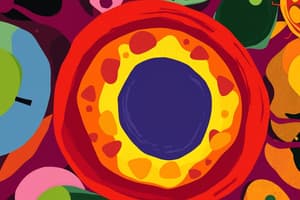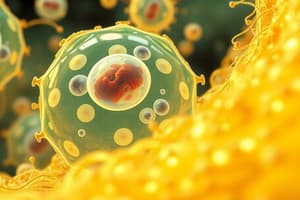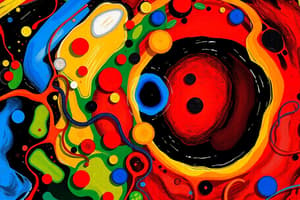Podcast
Questions and Answers
Which organelle is known as the 'powerhouse' of the cell?
Which organelle is known as the 'powerhouse' of the cell?
- Mitochondria (correct)
- Nucleus
- Endoplasmic Reticulum
- Golgi Apparatus
What is the function of the Golgi Apparatus in a human cell?
What is the function of the Golgi Apparatus in a human cell?
- Control cellular activities
- Store genetic material
- Produce energy
- Modify, sort, and package proteins and lipids (correct)
Which main components make up a human cell?
Which main components make up a human cell?
- Centrioles, Endoplasmic Reticulum, Lysosomes
- Cell Wall, Cytoplasm, Nucleolus
- Cell Membrane, Ribosomes, Chloroplasts
- Cell Membrane, Cytoplasm, Nucleus (correct)
Which cell type has a well-defined nucleus and membrane-bound organelles?
Which cell type has a well-defined nucleus and membrane-bound organelles?
What is the function of the cell membrane in a human cell?
What is the function of the cell membrane in a human cell?
What is the role of the Endoplasmic Reticulum in a human cell?
What is the role of the Endoplasmic Reticulum in a human cell?
Which organelle is responsible for the synthesis of ribosomal RNA (rRNA)?
Which organelle is responsible for the synthesis of ribosomal RNA (rRNA)?
What is the primary function of lysosomes?
What is the primary function of lysosomes?
What is the primary function of human cells?
What is the primary function of human cells?
How do cells communicate through indirect processes?
How do cells communicate through indirect processes?
During which stage of cell division do chromosomes align in the center of the cell?
During which stage of cell division do chromosomes align in the center of the cell?
What process is crucial for growth, development, and tissue repair in multicellular organisms like humans?
What process is crucial for growth, development, and tissue repair in multicellular organisms like humans?
Flashcards are hidden until you start studying
Study Notes
Human Cell
Cell Structure
A human cell is the fundamental unit of life. It consists of different organelles, which perform specific functions to maintain the cell's overall health and survival. There are two main types of cells: eukaryotic and prokaryotic. Eukaryotic cells, which include human cells, have a well-defined nucleus and membrane-bound organelles. The main components of a human cell are the cell membrane, cytoplasm, and nucleus.
- Cell Membrane: The cell membrane is a lipid-based structure that surrounds the cell and controls the movement of substances into and out of the cell.
- Cytoplasm: The cytoplasm is the jelly-like substance inside the cell membrane. It contains various organelles and proteins that perform various cellular functions.
- Nucleus: The nucleus is the control center of the cell. It contains the genetic material (DNA) and coordinates cellular activities.
Cell Organelles
Each organelle in a human cell has a specific role in the cell's function. Some of the main cell organelles include:
- Mitochondria: Mitochondria produce energy (ATP) for the cell through a process called cellular respiration.
- Endoplasmic Reticulum (ER): The ER is a network of tubules that synthesizes, processes, and transports proteins and lipids.
- Golgi Apparatus: The Golgi apparatus modifies, sorts, and packages proteins and lipids for transport to their final destinations.
- Lysosomes: Lysosomes contain enzymes that break down cellular waste and foreign substances.
- Ribosomes: Ribosomes are involved in protein synthesis.
- Nucleolus: The nucleolus is responsible for the synthesis of ribosomal RNA (rRNA) and the assembly of ribosomes.
Cell Communication
Cells communicate with each other through direct and indirect processes. Direct communication occurs through the exchange of proteins or metabolites between cells. Indirect communication occurs through the release of chemical messengers, such as hormones or neurotransmitters, that can affect the behavior of distant cells.
Cell Function
The primary function of a human cell is to maintain life. This includes digesting food and other nutrients, producing energy, growing and repairing tissues, and responding to environmental stimuli. Human cells can also perform specialized functions based on their type. For example, muscle cells contract to move the body, and nerve cells transmit electrical signals for communication.
Cell Division
Cell division is the process by which a single cell divides into two or more identical daughter cells. It occurs through the stages of prophase, metaphase, anaphase, and telophase. This process is crucial for growth, development, and tissue repair in multicellular organisms like humans.
Studying That Suits You
Use AI to generate personalized quizzes and flashcards to suit your learning preferences.




